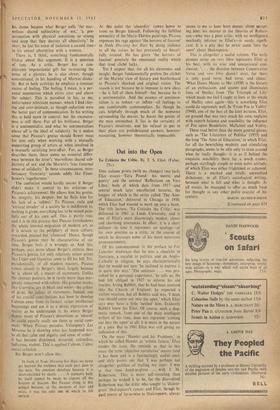Out into the Open
THIS volume prints (with no changes) two barly Eliot essays—'Ezra Pound: his metric and poetry' and the seminal 'Reflections on Vers Libre,' both of which date from 1917—and several much later uncollected lectures, the longest of which is the series called 'The Aims of Education,' delivered in Chicago in 1950, which Eliot had wanted to work up into a book. The title lecture, 'To Criticize the Critic,' was delivered in 1961 at Leeds University, and is one of Eliot's most disarmingly modest, clever and charming utterances. In effect, it is a short defence—in tone it represents an apology—of his own practice as a critic, in the course of which he discusses some of his more notorious pronouncements.
Of his announcement in the preface to For Lancelot Andrewex that he was a classicist in literature, a royalist in politics, and an Anglo- Catholic in religion, he says characteristically that he would not now 'be inclined to express it in quite this way.' The sentence . . . was pro- voked by a personal experience,' he tells us. He had felt obliged in 1927 to inform his old teacher, Irving Babbitt, that he had been received into the Church of England; he expected a violent reaction, but all Babbitt said was, 'I think you should come out into the open,' which Eliot says may have a little 'nettled' him. Evidently Babbitt knew his Eliot. Of course, such a dog- matic remark, from one of the most intelligent writers of his time, does not represent 'coming out into the open' at all; it is' more in the nature of a joke. But in 1961 Eliot was still giving no indication of this.
On the essay 'Hamlet and his Problems,' in which he called Hamlet an 'artistic failure,' Eliot evades the issue. He reminds us that in this essay the term 'objective correlative' occurs (and it has been and is a fascinatingly useful one), and slyly points out that 'I was perhaps not altogether guiltless of trailing my coat: I was at that time hand-in-glove . . . with J. M. Robertson.' This is more self-revealing than perhaps he wished it to be, for the discredited Robertson was the critic who sought to 'disinte- grate' Shakespeare's canon; and Eliot, though he paid plenty of lip-service to Shakespeare, always
seems to me to have been uneasy about accept- ing him; his interest in the theories of Robert- son—who was a poor critic, with an intelligence markedly inferior to Eliot's—is surely signifi- cant. It is a pity that he never came 'into the open' about Shakespeare.
This is altogether a useful volume. The early pioneer essay on viers fibre represents Eliot at his best, with its wise and unequivocal con- clusion, '. . . the division between Conservative Verse and viers fibre doesn't exist, for there is only good verse, bad verse, and chaos.' 'What Dante Means to Me' (1950) is the history of an enthusiasm, and quotes and illuminates lines of Shelley from 'The Triumph of Life' which made me feel 1 ought to look at the whole of Shelley once again—this is something Eliot could do supremely well. In 'From Poe to Valery' (1948), one of the best of the later lectures, Eliot, on ground that was very much his own, explains with superb balance and sensibility the influence of Poe upon Baudelaire, Mallarme and Valery.
These read better than the more general pieces, such as 'The Literature of Politics' (1955) and the long 'The Aims of Education,' in which Eliot, for all the bewitching modesty and stimulating paragraphs, seems to be able only to skate around what he really thought--it is as if behind the exquisite sensibility there lay a much cruder, perhaps startlingly simple or even naïve attitude, of which Eliot was either frightened or ashamed. There is a marked and totally unresolved dichotomy, in all Eliot's sociological writing, between what is felt and what is thought. At all events, he managed to offer as much food for thought as any other polite essayist of his [Continued on page 624














































 Previous page
Previous page